Emergency Dentist Cottonwood Heights
Get the Urgent Care You Need Fast
No one wants to deal with a dental emergency, but the worst thing you can do is simply ignore it and assume it will get better on its own. The good news is when you need emergency dentistry in Cottonwood Heights most, Dr. Hansen and his team are here to help. Not only is Dr. Hansen trained to handle a variety of dental emergencies, but he’s also happy to schedule same-day emergency appointments. Simply give us a call and we’ll get you set up as soon as possible!
Why Choose White Peak Dental for Emergency Dentistry?
- Same-Day Emergency Appointments Available
- Highly Experienced Dentist Dedicated to Your Comfort
- Powerful Sedation Dentistry In-House for Anxious Patients
What to Do in a Dental Emergency

- Get your same-day appointment scheduled: The moment you notice something isn’t right, call our office so you can get a same-day appointment set up. Not only can we schedule your visit, but we can provide first-aid tips over the phone. We are open five days a week, so don’t hesitate to call even if you’re unsure you’re having a dental emergency.
- Receive an emergency exam and get pain relief: Once we know what’s causing your dental emergency, we can begin providing you with relief to get out of pain. As part of this process, we’ll perform an exam and potentially capture digital X-rays if necessary.
- Discuss your options after hearing our findings: After learning the cause and severity of your emergency, we’ll recommend a treatment plan to stop it from worsening or coming back. This plan will include estimated costs and an expected timeline as well, so you’ll have as much information as possible before making any decisions.
-
Complete your treatment with our team: Our experienced team is prepared to help you get the care you need, whether it involves dental fillings, crowns, root canal therapy, extractions, or another service entirely.
The Most Common Dental Emergencies
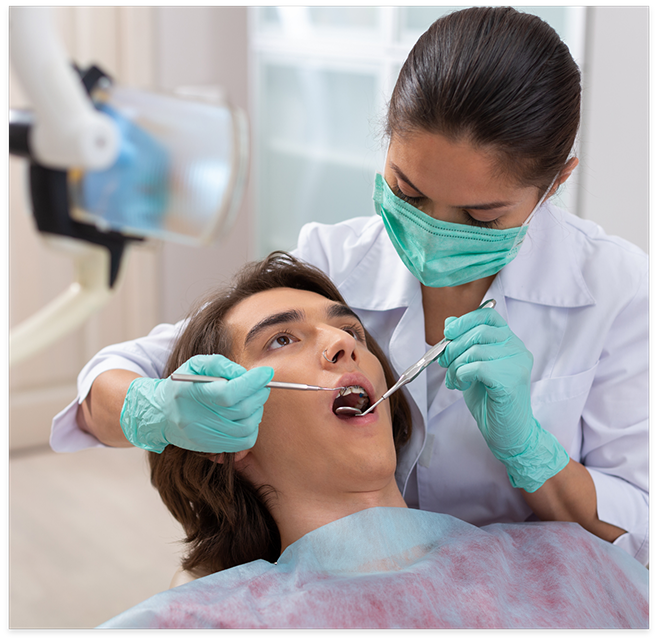
Some of the most common types of dental emergencies include toothaches and damaged teeth, but they can come in many different forms. The best thing you can do is call our office right away so you can get your emergency treated, no matter how minor or severe. Some of the most common emergencies we treat (and how to manage them before you arrive) can be found below.
Toothaches

Is My Toothache a Dental Emergency? Despite popular belief, toothaches should not be ignored. Worst case scenario, the tooth is severely damaged and requires same-day treatment. Best case scenario, we catch a serious oral health concern in the early stages, before it takes a toll on the look and function of your smile.
How You Should Handle a Toothache: Step one is calling our Cottonwood Heights dental team to schedule an appointment with Dr. Hansen. Until your visit, you should swish with warm salt water periodically to prevent an infection, avoid chewing on that side of your mouth to avert additional discomfort, and take an OTC pain reliever to alleviate any pain you’re feeling.
How We Treat Toothaches: There are several ways we can restore a damaged tooth, and how we intervene depends largely on the root of the problem and how severe it is. For example, while a large cavity may be treated with a tooth-colored filling or dental crown, there are other cases where root canal therapy is needed.
LEARN MORE ABOUT DENTAL CROWNS
Chipped Tooth

Is a Chipped Tooth a Dental Emergency? Chipped teeth do warrant a call to our Cottonwood Heights dental team. However, they don’t always require same-day treatment. Over the phone, our team can determine if you need to come in right away and guide you through how to handle this dental injury in the meantime.
How You Should Handle a Chipped Tooth: Naturally, you shouldn’t chew on that side of your mouth until we’ve treated your tooth. You may also find it helpful to cover the sharp edge with some dental wax or sugar-free gum to prevent a soft tissue injury and dental sensitivity. Before doing so, make sure to rinse your mouth thoroughly with clean, lukewarm water (this will remove any lingering shards of your tooth and help prevent an infection from developing).
How We Treat Chipped Teeth: One of the most popular treatments for chipped teeth is veneers. Crafted from high-quality and lifelike dental materials, this cosmetic dental treatment can last for upwards of 30 years and can be placed in three visits or less!
Cracked Tooth
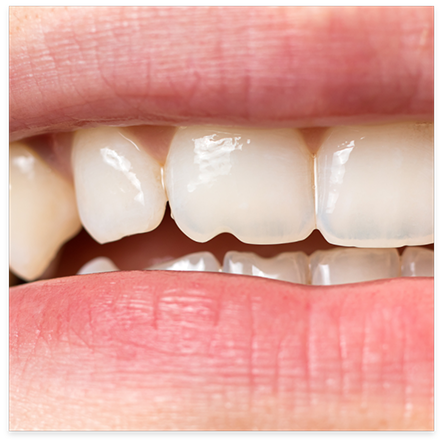
Is a Cracked Tooth a Dental Emergency? Have you cracked a tooth? Even if the damage is relatively small, you should schedule an appointment with our Cottonwood Heights emergency dentist, Dr. Hansen. That way, he can restore the look and function of your tooth before it becomes infected or splits further.
How You Should Handle a Cracked Tooth: We recommend rinsing with clean water to help prevent an infection, not chewing on that side of your mouth, and taking OTC pain medication as instructed. These are short-term measures that will help prevent additional damage and keep you comfortable until you arrive at our office for treatment.
How We Treat Cracked Teeth: Typically, a dental crown can restore a cracked tooth. In cases of severe dental damage, we may need to remove the tooth entirely to restore your oral health. Don’t worry – we can fill the gap in your smile with a dental bridge or implant, so the look and function of your smile aren’t negatively impacted in the long term.
LEARN MORE ABOUT DENTAL CROWNS
LEARN MORE ABOUT DENTAL BRIDGES
LEARN MORE ABOUT DENTAL IMPLANTS
Sensitivity to Hot & Cold
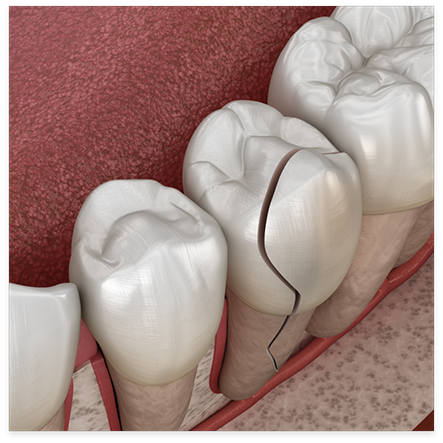
Are Very Sensitive Teeth a Dental Emergency? Not always. However, if you’ve been experiencing dental sensitivity for more than 24 hours now (or it’s present in tandem with other abnormal symptoms), then we do recommend at least giving our Cottonwood Heights dental team a call. That way, we can determine if a same-day appointment is necessary.
How You Should Handle Very Sensitive Teeth: From home, the only thing you can do is try to minimize your dental sensitivity or avoid it altogether. Many patients find it helpful not to eat anything cold or drink anything hot. However, you can also take OTC pain medication if the discomfort persists.
How We Treat Very Sensitive Teeth: After taking X-rays and conducting a visual exam, we will be able to pinpoint both the source of your discomfort and how severe the root of the problem is. In many cases, dental sensitivity is the result of untreated tooth decay, which can be addressed with a tooth-colored filling or dental crown.
LEARN MORE ABOUT DENTAL CROWNS
Knocked-Out Tooth

Is My Knocked-Out Tooth a Dental Emergency? There’s no doubt about it – a knocked-out tooth always necessitates a same-day visit to our Cottonwood Heights dental office for treatment. In fact, the sooner you get to us, the better! Saving your tooth is a race against the clock.
How You Should Handle a Knocked-Out Tooth: Priority number one is calling our office so we can see you within 60 minutes of the incident. Before you head our way, do your best to find your tooth. If you are able to locate it, then preserve the root by picking it up by the crown and submerging it in a container of milk or saliva.
How We Treat Knocked-Out Teeth: Since there’s nothing quite like your natural teeth, our team will always see if we can save your tooth first. If that’s simply not an option, then we will need to fill the new space in your smile with a tooth-replacement solution, such as a dental bridge or dental implant.
LEARN MORE ABOUT DENTAL BRIDGES
LEARN MORE ABOUT DENTAL IMPLANTS
Lost Filling or Crown
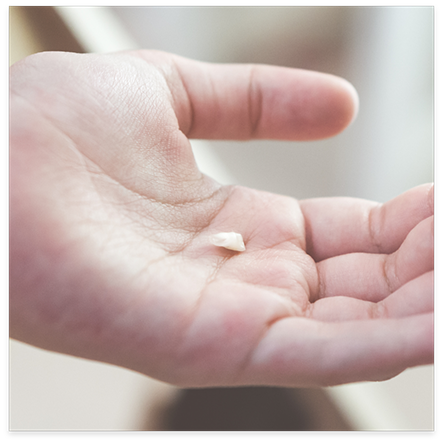
Is a Lost Filling or Crown a Dental Emergency? Both lost fillings and lost dental crowns warrant same-day treatment from our Cottonwood Heights emergency dentist, Dr. Hansen. If you don’t take care of this dental injury immediately, your tooth could sustain further damage, like a chip or crack.
How You Should Handle a Lost Filling or Crown: In both situations, we recommend following these steps: scheduling an appointment with our team, rinsing your mouth with clean water, and preserving your restoration in a clean bag or storage case.
How We Treat Lost Fillings or Crowns: For the large majority of patients, lost fillings are simply replaced with new ones since the process is so quick and painless. However, how we handle a lost dental crown varies. For some patients, we can re-cement their old one back in place. For others, we need to put a temporary crown in place until a new one is made.
LEARN MORE ABOUT DENTAL CROWNS
Broken Denture

Is My Broken Denture a Dental Emergency? Broken dentures are a dental emergency! To ensure we can restore the look, function, and health of your smile ASAP, we recommend scheduling a same-day appointment with us.
How You Should Handle a Broken Denture: First, do not wear your broken dentures or use super glue to place them back together. Instead, store your restoration in a clean container and schedule an appointment to have it repaired or replaced.
How We Treat Broken Dentures: If there is only a minor crack in your denture, then we may be able to repair it. However, if the damage is more severe, then we will either need to provide you with a replacement or have implant dentures made.
LEARN MORE ABOUT DENTAL IMPLANTS
Loose Tooth
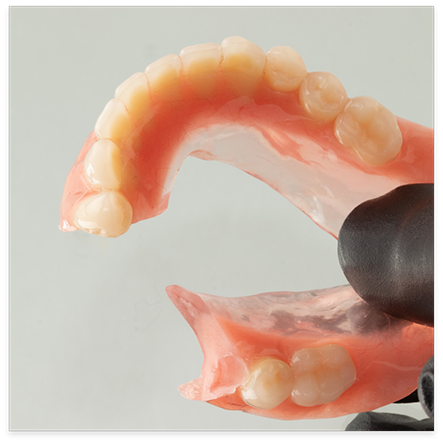
Is a Loose Permanent Tooth a Dental Emergency? Yes, a loose tooth is definitely a dental emergency. Remember, even if you aren’t in any pain, your bite is now compromised. Furthermore, your tooth can fall out if you don’t act quickly.
How You Should Handle Loose Permanent Teeth: Until you arrive at our Cottonwood Heights dental office for treatment, your top priority is preventing the tooth from becoming looser, falling out, or becoming infected. So, don’t wiggle the tooth with your tongue, don’t chew on that side of your mouth, and rinse with clean, room-temperature water periodically.
How We Treat Loose Permanent Teeth: Sometimes, a dental splint can be used to give your tooth the support it needs. If that’s no longer feasible, then we will need to move on to the next option: extracting it. The good news is that we offer multiple tooth-replacement solutions to restore the look and function of your smile, including dental bridges and dental implants.
LEARN MORE ABOUT DENTAL BRIDGES
LEARN MORE ABOUT DENTAL IMPLANTS
Gums, Lips or Tongue Injury
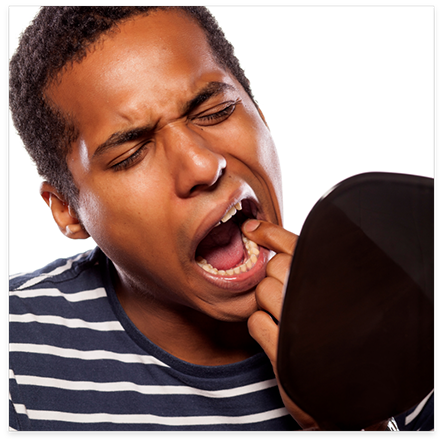
Is an Injury to the Gums, Lips, or Tongue a Dental Emergency? Soft tissue injuries can produce a lot of blood, which is often why patients think they need to schedule an appointment with our Cottonwood Heights emergency dentist. However, this usually isn’t necessary since the bleeding often subsides within 10 minutes.
How You Should Handle an Injury to the Gums, Lips, or Tongue: To handle a soft tissue injury from home, we recommend using clean water to rinse the wound thoroughly. Then, you should apply pressure to the cut with a damp washcloth until the bleeding stops. If it doesn’t stop after 10 minutes, seek medical attention at the ER.
How We Treat Injuries to the Gums, Lips, or Tongue: Although we don’t normally treat soft tissue injuries, we can definitely guide you through how to handle this dental injury over the phone. So, don’t hesitate to call if you’re unsure what to do!
Jaw Pain or Clenching
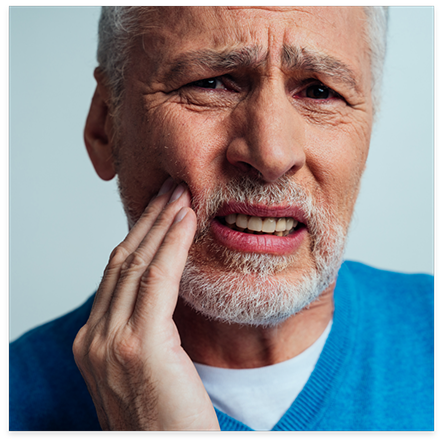
Is Jaw Pain a Dental Emergency? Jaw pain can be incredibly inconvenient, making eating, sleeping, and even concentrating difficult. If you’ve been struggling with discomfort for more than 24 hours, then call our Cottonwood Heights dental team to schedule an appointment.
How You Should Handle Jaw Pain: From home, we recommend placing a cold compress against the outside of your jaw in 10-minute intervals. You can also stick to soft foods and take an OTC pain reliever as directed to alleviate discomfort stemming from your jaw.
How We Treat Jaw Pain: How we intervene will depend entirely on what’s causing your jaw pain. For some patients, we can remove an impacted wisdom tooth to provide long-lasting relief. For others, we can have a custom mouthguard made to prevent chronic teeth grinding.
Something Stuck Between Teeth
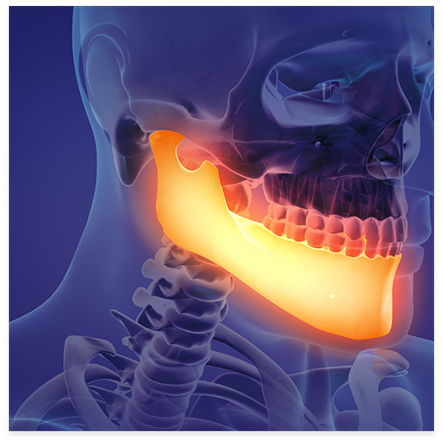
At first, having something stuck between your teeth may not seem like much of an issue. However, if the food particles or debris aren’t removed, then your teeth can begin to decay, and your gums can become infected. So, don’t wait. First, swish some warm salt water around your mouth. Then, use your floss to gently clean between your teeth. If the debris doesn’t come loose, then give us a call.
Understanding the Cost of Dental Emergencies

Without knowing what is happening inside your mouth, we won’t know for sure how much your dental emergency will cost. Following an evaluation of your smile, we can make recommendations from there. Once we know the best treatment for your needs, we can begin providing cost estimates. Our team will always break down what you can expect to pay before beginning treatment. Just keep in mind that putting off your necessary care can allow the emergency to get worse, leading to higher costs anyway. Compared to a medical emergency, you may be surprised by the affordability of your emergency exam.
Every Dental Emergency is Different
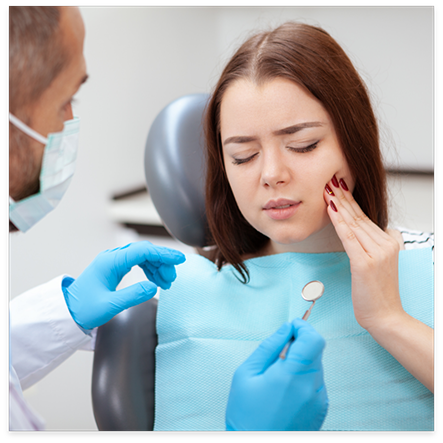
It’s impossible to predict the overall cost of your care without knowing the root cause of your symptoms. Depending on the severity of your emergency, we will recommend treatments that most effectively address your symptoms. While simple solutions like dental fillings or prescription mouthwashes could be all you need, you could also require dental crowns, root canal therapy, or even an extraction to protect your oral health. These come with other associated costs, such as dental restorations. Before you make any decision on your care, you’ll be able to see the details of your costs and treatment options before we perform any service.
Does Dental Insurance Cover Dental Emergencies?

In most cases, dental insurance providers will offer some level of coverage for dental emergencies. This usually includes coverage for one annual emergency exam. In other cases, they offer partial coverage for services to treat specific issues. Generally, treatments like dental crowns, root canal therapy, and extractions receive between 80% and 50% coverage. If you have dental insurance, be sure to examine its yearly maximums and when they come into effect. Our team is happy to help look over your plan and maximize your benefits to the fullest.
Other Options for Making Dental Emergencies Affordable

If you do not have dental insurance at this time, we do offer other options to make your care more affordable. For example, our in-house membership plan provides coverage for one emergency exam and X-ray every year. Enrolling can help make your dentistry more predictable and less costly overall. We encourage you to speak with our front desk about our membership plan as well as other options to finance your emergency dentistry.
Taking Care of Your Smile Can Save You Money

Some dental emergencies are indeed impossible to avoid, but there are ways you can reduce your risk and lower your oral healthcare costs along the way. Did you know that most dental emergencies occur as a result of poor oral hygiene? By staying on top of your at-home brushing and flossing and completing biannual dental checkups, you prevent and catch dental issues before they become dental emergencies to begin with!
Furthermore, the moment you’re aware a dental emergency is present, don’t wait to get it settled. Call our office immediately so you can prevent it from rapidly worsening. Think of it this way, a tooth that develops a cavity and only needs a dental filling now could end up needing a crown or root canal therapy the longer you wait.
How to Prevent Dental Emergencies

Most dental emergencies can be prevented when you know the right day-to-day tips to keep in mind. Because these unexpected situations are often stressful and scary, it’s always easier to keep them from happening than it is to deal with when one pops up. Below, we’re sharing a few simple ways you can drastically lower your risk of dental disaster. Should you find yourself experiencing a dental emergency in Cottonwood Heights anyway, don’t hesitate to give our office a call.
Visit Your Dentist Regularly

Everyone should be visiting their dentist every six months for a checkup and cleaning. These routine appointments allow us to spot and treat problems before they turn into painful complications. We’ll also perform a thorough examination and cleaning to keep issues from happening in the first place. Our team will do everything possible to keep your smile in tip-top shape.
Maintain Good Oral Hygiene Habits at Home

Taking proper care of your teeth and gums is essential for a healthy mouth. Brushing twice a day, flossing daily, and rinsing every day with an ADA-approved mouthwash are excellent practices that will help keep your oral cavity free of harmful particles and bacteria. Following a solid dental hygiene routine every day will lower your chances of needing to visit your emergency dentist in Cottonwood Heights.
Be Careful with Your Diet

Believe it or not, your diet has a significant impact on oral health. Overindulging in sugary, starchy, or acidic foods will put you at risk of several dental problems (i.e., cavities, decay, gum disease). It’s strongly recommended that you stick to a diet full of nutrient-rich foods like fruits, vegetables, whole grains, lean proteins, and dairy products. Not only will these keep your waistline slim, but they’ll improve your oral health.
Wear a Mouthguard
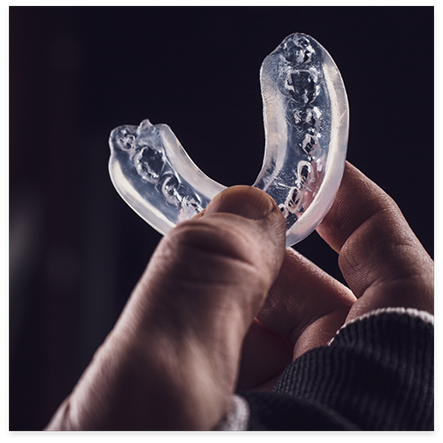
If you regularly play sports, you should ask our team about a custom-made mouthguard. The device will protect your pearly whites from any impact should you sustain a blow to the face. For those who grind their teeth at night, a nightguard is an excellent way to keep the enamel safe. It’ll protect your smile from the force of your teeth grinding at night.
Use Tools, Not Teeth to Open Packaging

When you can’t crack open a bottle or tear open a package, you may be tempted to use your teeth as a last-ditch effort. Well, using your pearly whites for anything other than chewing food can easily cost you a trip to your emergency dentist in Cottonwood Heights. It’s always best to wait until you have the right tool or ask someone to lend you a helping hand.
Dental Emergency FAQs
Can the Emergency Room Remove a Tooth?
Only licensed dentists can perform treatments like tooth extractions, which means anyone without a license is performing the treatment illegally. This is because dentists must undergo training and education to complete a treatment like this. Most hospitals don’t have dentists on staff, so if you’re expecting them to remove your tooth (or perform other treatments commonly done in dental offices), you’re out of luck. At best, they may provide painkillers or antibiotics, but still tell you to go to a dental office instead. Keep in mind that a tooth extraction may not even be the best option to get you out of pain. Root canal therapy could be performed instead, which gets you out of pain and lets you keep your tooth.
Are Toothpicks Safe to Use?
Toothpicks of any kind, especially wooden ones, are not always safe to use. They can easily damage enamel or gum tissue or could splinter and break inside your mouth, causing debris to get stuck and trigger an infection. If you are worried about getting food debris out of your mouth, using a toothpick could push it even further either between your teeth or underneath your gum line. For that reason, it’s best to use dental floss instead, and be sure to call our office if you’re struggling to remove debris from your mouth.
Should Knocked-Out Teeth Be Placed in Water?
Water can be used to rinse a knocked-out tooth of any dirt or debris, but you should not submerge them in water as a way to keep them preserved. Water can actually damage the root surface cells on teeth, which makes it harder to reimplant them back into the mouth. A better option would be to place it back into your open socket or a tooth preservation kit. Milk or saline solution are also good options. Just keep in mind that it will only remain preserved for about an hour before reimplantation becomes inviable.
Does Emergency Dentistry Cost More?
Emergency exams are not particularly expensive in most cases, but the services necessary to resolve and manage them do cost more than preventive care like exams and cleanings. For example, fillings, crowns, root canal therapy, and extractions will always carry higher price tags because of their restorative nature. With that said, the sooner you get seen by our office the better because you’ll reduce the chances of needing more expensive dentistry to treat your symptoms. If you lack dental insurance coverage, our office will help you create a financing plan that makes your emergency care possible.
Will My Toothache Go Away on Its Own?
In most cases, toothaches don’t just fade on their own. They typically persist until their underlying causes are addressed.
Given this reality, it’s crucial to have a dentist assess your oral pain. Various factors can contribute to toothaches; you’ll want to rule them out with a dental professional. Doing so will treat any underlying issues before they become serious.
Granted, there are rare situations where a toothache goes away naturally. One example is minor gum irritation around a tooth that slowly stabilizes. However, you’d still want to see a dentist for help. It’s better to be safe than sorry.
How Should I Sleep with Tooth Pain?
If you can’t treat it in time, you may have to sleep with tooth pain. Should that happen, you’ll want to take the following steps:
- Elevate Your Head: As best you can, sleep with your head elevated on a thick pillow or several pillows. Elevation relieves pressure caused by blood flow into the head and mouth.
- Take Medication: To relieve your discomfort, take store-bought pain relievers as needed. (You can maximize these medications’ effects by avoiding acidic, cold, or hard food before bed.)
- Use a Cold Compress: In bed, apply a cold compress to the affected area. It’ll help reduce some of your aches.
Do I Need to Visit an Emergency Dentist for a Chipped Tooth?
Even if they don’t hurt, you should see a dentist for minor tooth chips. Whether chipped, fractured, or broken, teeth can’t regrow lost enamel. Instead, they’ll just suffer further damage if left untreated. (A sharp or jagged tooth could even cut against your gums by accident.)
Depending on a chip’s severity, dentists have several ways to treat this issue. One option is to repair the damage with filling material, which will help the tooth look and feel better. Another, meanwhile, is to polish and smooth out the chipped area. For a more severe crack or fracture, though, the dentist may need to place a crown to prevent further harm.
What Does Chronic Bad Breath Mean?
Unfortunately, chronic bad breath isn’t just caused by “morning breath” or a smelly meal. It’s usually a sign of a serious oral health problem.
There are several potential causes of chronic bad breath. These factors include cavities, gum disease, and even tooth infections. At the same time, a bad-smelling mouth can also stem from smoking and tobacco use in general.
Call a dentist at once if your bad breath persists for an extended period (i.e., more than a few days). They can confirm whether any underlying problems are present.
